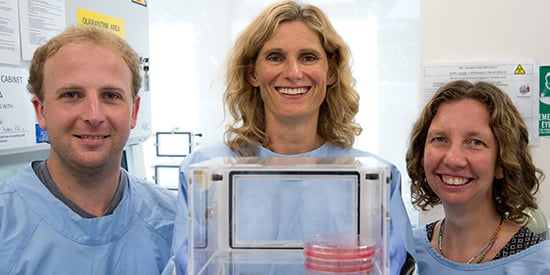NHMRC grants help Deakin scientists tackle malaria and mental health
Media releaseTwo Deakin University researchers have been awarded prestigious fellowships from the National Health and Medical Research Council (NHMRC) to further their work on new ways to treat two of the world's most taxing health issues.
The fellowships will provide more than $1 million in funding for Professor Tania de Koning-Ward and Dr Olivia Dean to lead projects building on their research in Deakin's School of Medicine.
Professor de Koning-Ward leads a team in the School's Centre for Molecular and Medical Research, looking at the Plasmodium parasites that cause malaria, with the goal of identifying new strategies for drug and vaccine development.
Dr Dean's fellowship will support work she is carrying out at IMPACT TRIALS, based in the Centre for Innovation in Mental, Physical and Clinical Treatment, investigating new, biologically-based treatments for people with depression.
Understanding malaria
Professor de Koning-Ward has been researching malaria for almost 20 years.
During her NHMRC Senior Research Fellowship, she will analyse how malaria parasites alter the permeability of their host cells in order to access nutrients, building on her team's discovery of some of the molecular components involved in this pathway earlier this year.
"Knowing the molecular makeup of the permeation pathways is crucial in determining how nutrient uptake can be interfered with, and will provide insight into whether the parasite can modify these pathways to inhibit uptake of particular drugs and toxic compounds," she said.
Professor de Koning-Ward will also analyse malaria infections from the host's perspective to understand why some people are more susceptible to malaria than others.
New treatments for depression
Dr Dean's research focuses on biologically-based approaches to treating symptoms of depression and she said the need for new treatments was clear.
"There is evidence to suggest that people with major depressive disorder have increased levels of inflammation in their body. These new hypotheses, which include immune inflammatory theory, provide new avenues for exploring further biological treatments," she said.
Dr Dean and her team recently conducted a world-first clinical trial that found a common, broad spectrum antibiotic used mostly to treat acne could improve the quality of life for people with major depression.
She is also leading a clinical trial using the rind of the tropical fruit mangosteen for treatment of depressive symptoms.
"In the longer term, the information generated by this research could further the design and development of next-generation antidepressant agents, and explore mechanisms underpinning depression, ultimately working towards prevention," Dr Dean said.

